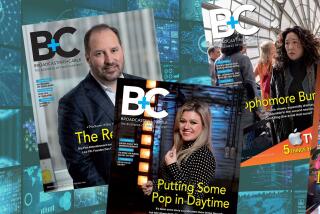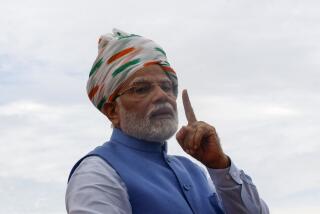Britain’s Fabled BBC Facing Uncertain Future : Media: Competition from private companies and financial pressures are taking their toll.
- Share via
LONDON — In the marble halls of Broadcasting House, home of the British Broadcasting Corp. for nearly all of its 64 years, unprecedented questions are being asked.
What is the BBC and what is it for?
Now the world’s largest and most diverse programmer, the BBC gave the world “Monty Python’s Flying Circus” and Kenneth Clarke’s “Civilization.”
It broadcasts to the world in 33 languages plus English, and kept Soviet President Mikhail S. Gorbachev informed when he was held prisoner in his Crimean dacha during the attempted Soviet coup in August.
But the BBC, dependent on a TV license fee that is not keeping pace with inflation, faces financial pressures and competition from new broadcasters.
“The BBC has a major problem if it wishes to maintain its current range of public service broadcasting within a static income,” Michael Checkland, the corporation’s director-general, said in a recent interview.
The BBC’s Royal Charter is up for renewal in 1996, and Checkland has created a panel to review operations and draw up a plan for the BBC for the next century. The panel is to announce its initial proposals next summer.
Checkland retains a bullish vision of BBC’s role at the heart of British broadcasting.
“If Britain is to have a strong broadcasting industry, it must have a strong center. There is only one strong center around and it is not going to be 15 independent ITV companies; it is the BBC,” he said.
The BBC operates two TV and five radio networks, 37 local radio stations, the international World Service radio and World Service TV.
The “Today” morning news program on Radio 4 is required listening, and an important podium, for Britain’s news makers.
The BBC has a staff of 25,000 and a budget of nearly $2.5 billion.
It also has critics, some of them in Parliament, who believe the BBC does many things that might be done as well by private broadcasters.
“As more commercial broadcasting comes on stream, I cannot see the justification for the BBC to carry the amount of broadcasting it does at the moment,” said Roger Gale, chairman of the Conservative Party’s informal media committee in the House of Commons.
He believes the BBC should dump soap operas such as “Eastenders” and “Neighbors” and talk shows such as “Wogan” and concentrate on one public service TV channel and one radio station, carrying news, sport, films and documentaries.
“Why should the public pay through the license fee to have so-called public-service broadcasting, which isn’t really public service at all, and which is duplicated by commercial TV?” he said.
Chartered as the “national broadcaster” in 1927, the BBC is mainly financed by license fees paid by everyone in Britain who has a TV set. Home Secretary Kenneth Baker raised the annual fee this year by $10 to $130, an increase 3% less than the rate of inflation.
A government-commissioned report by the accounting firm Price Waterhouse identified potential savings of more than $337 million in the BBC’s budget.
The BBC had already planned to cut spending by $126 million by 1993, but the reductions have been accelerated. More than 4,000 jobs will be eliminated, including 720 this year in the BBC’s network television operation in London.
The corporation’s introspection is not prompted by belt-tightening alone. The broadcasting world is changing.
New broadcasters are bidding for franchises to run the commercial TV stations that make up one of Britain’s independent channels, and another independent channel is to be created.
In addition, three new commercial radio networks will provide the first-ever national competition to the BBC’s radio networks.
The BBC faces further erosion of its share of the broadcasting market because of the steady growth of satellite and cable channels in Britain, which will accelerate in 1993 when trade barriers within the European Community come down.
The justification for funding the BBC by a license fee is that most people watch and listen to it.
The BBC’s share of the television market is down to 48%, compared to 52% for ITV, though more than 90% of Britons tune into some BBC broadcasts every week.
Right-wing, free-market critics have long criticized the license fee and what they see as the BBC’s near-monopolistic power.
The BBC, they say, should be broken up and funded by advertising or possibly by subscription, pay-per-view TV.
Even the left-leaning Institute of Public Policy Research has advocated abandoning the license fee in favor of annual appropriations from the government.
Checkland dismisses that out of hand, saying the annual budget battles would make long-term planning impossible. And he says that pay-per-view would be inappropriate for a general TV service going to 20 million homes.
More to Read
Sign up for Essential California
The most important California stories and recommendations in your inbox every morning.
You may occasionally receive promotional content from the Los Angeles Times.












